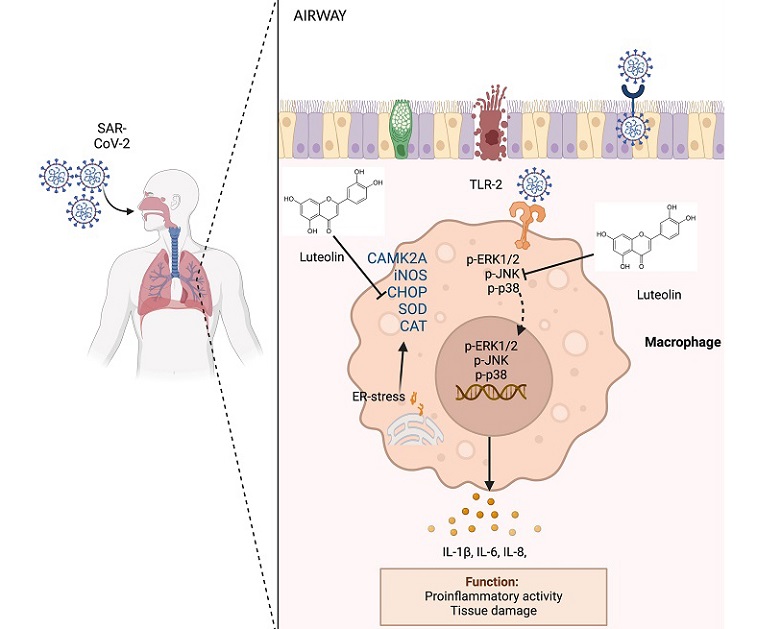Thailand Medical Researchers Explore Luteolin’s Potential in Reducing COVID-19 Inflammation
Nikhil Prasad Fact checked by:Thailand Medical News Team Oct 23, 2024 1 year, 2 months, 5 days, 21 hours, 11 minutes ago
Thailand Medical: Researchers from multiple institutions in Thailand have recently unveiled promising results regarding the use of luteolin, a natural flavonoid, to combat inflammation caused by the COVID-19 spike protein. This breakthrough sheds light on the potential of luteolin in addressing one of the major complications of the pandemic: inflammation, which plays a critical role in the severe symptoms seen in COVID-19 patients.
 Graphical Abstract: Thailand Medical Researchers Explore Luteolin’s Potential in Reducing COVID-19 Inflammation
Graphical Abstract: Thailand Medical Researchers Explore Luteolin’s Potential in Reducing COVID-19 Inflammation
The study was carried out by scientists from the Faculty of Veterinary Medicine and the Center for Research and Development of Natural Products for Health, both at Chiang Mai University. Additionally, experts from the Department of Biochemistry at the Faculty of Medicine, Chiang Mai University, and the Anticarcinogenesis and Apoptosis Research Cluster, were also involved in this research. These collaborative efforts have contributed to a deeper understanding of how luteolin can reduce the effects of inflammation triggered by the spike protein in immune cells.
Luteolin’s Role Against Spike Protein-Induced Inflammation
The COVID-19 virus is notorious for inducing severe inflammation, especially in the lungs and immune system, which exacerbates the symptoms and complications in patients. Previous research had established that the spike protein (S1) of SARS-CoV-2 plays a significant role in this inflammation by activating immune cells. However, this
Thailand Medical news report brings new insights into how the natural compound luteolin might counteract these effects.
Luteolin, commonly found in fruits and vegetables, has long been recognized for its anti-inflammatory properties. In this study, the researchers sought to determine whether luteolin could inhibit inflammation in macrophages, which are critical immune cells that contribute to the body’s inflammatory response.
The Experiment: Understanding Luteolin’s Mechanisms
The study employed a cell model using THP-1 macrophage cells, which are often used to simulate human immune responses. The cells were treated with the spike protein S1 to observe the inflammation mechanisms. Researchers then introduced luteolin to observe its potential inhibitory effects.
Through various advanced techniques, such as mRNA sequencing and bioinformatics analysis, the researchers found that the spike protein significantly increased the production of inflammation-inducing molecules and activated a variety of cellular pathways associated with inflammation, notably the ER stress-induced Calcium/CHOP/MAPK pathway.
The key finding of the study is that luteolin can significantly reduce the expression of genes involved in ER stress and inflammation, particularly those triggered by the spike protein. Luteolin was shown to decrease the expression of critical inflammation-related markers, such as IL-6, IL-8, and IL-1β, which are known to exacerbate the severity of COVID-19 symptoms.
&a
mp;nbsp;
Key Findings on Luteolin’s Impact
Luteolin worked by inhibiting pathways that are often activated by the spike protein to induce inflammation. Specifically, the researchers found that luteolin downregulated the Calcium/CHOP/MAPK signaling pathway, which is key in the inflammatory response in immune cells. This pathway is normally triggered by the spike protein of the virus, leading to overactive immune responses, which can result in damaging levels of inflammation.
In their analysis, researchers highlighted several key genes (CAMK2A, SIGLEC7, PPARGC1B, and others) that were upregulated by the spike protein in the THP-1 cells. When luteolin was introduced, the expression of these genes was significantly reduced, demonstrating its potential in mitigating the inflammatory response. Notably, luteolin’s effect was dose-dependent, meaning that higher concentrations of luteolin led to greater reductions in inflammatory markers.
How Does This Help COVID-19 Patients?
For COVID-19 patients, especially those experiencing severe symptoms or long-COVID, where inflammation remains an ongoing issue, luteolin presents a natural, plant-based option for managing inflammation. By reducing the activity of critical inflammatory pathways, luteolin could help manage and prevent the severe complications associated with the virus, such as acute respiratory distress syndrome (ARDS).
The Thailand research team emphasizes that luteolin could serve as a complementary therapy to current treatments, helping reduce inflammation and supporting the body’s immune response without causing additional side effects.
Broader Implications for Health
The benefits of luteolin go beyond COVID-19. Its ability to reduce inflammation has potential applications in a variety of chronic diseases where inflammation plays a major role, such as cardiovascular disease, diabetes, and neurodegenerative disorders like Alzheimer's disease.
The findings from this study are especially important for countries where access to more expensive, synthetic anti-inflammatory medications may be limited. Luteolin, being naturally abundant and accessible through various dietary sources, could offer an affordable and effective solution for managing inflammation in both acute and chronic conditions.
The Future of Luteolin Research
Although these initial results are promising, the researchers call for further studies to validate the effectiveness of luteolin in clinical settings. Human trials will be necessary to fully understand its therapeutic potential and determine the appropriate dosages for COVID-19 patients and those suffering from chronic inflammation.
Moreover, the research team points out that luteolin’s interaction with other treatments, especially in complex diseases like COVID-19, needs to be carefully studied. However, the current results pave the way for future investigations into natural compounds as viable alternatives or complementary therapies in fighting inflammation and immune-related conditions.
Conclusion: Natural Solutions to Global Health Problems
Luteolin’s role as a natural anti-inflammatory agent could be a game-changer in how we approach treatment for COVID-19 and other inflammation-related diseases. Its ability to inhibit the inflammatory pathways triggered by the spike protein offers a glimpse into a future where plant-based compounds complement conventional medicine in tackling global health crises.
The study findings were published in the peer-reviewed journal: Pharmaceuticals.
https://www.mdpi.com/1424-8247/17/10/1402
For the latest COVID-19 News, keep on logging to
Thailand Medical News.
Read Also:
https://www.thailandmedical.news/news/thailand-medical-researchers-discover-that-mulberry-leaf-extract-shows-potential-in-the-fight-against-covid-19
https://www.thailandmedical.news/news/thailand-medical-researchers-find-that-extracts-of-clinacanthus-nutans-lindau-can-inhibit-dengue-virus
